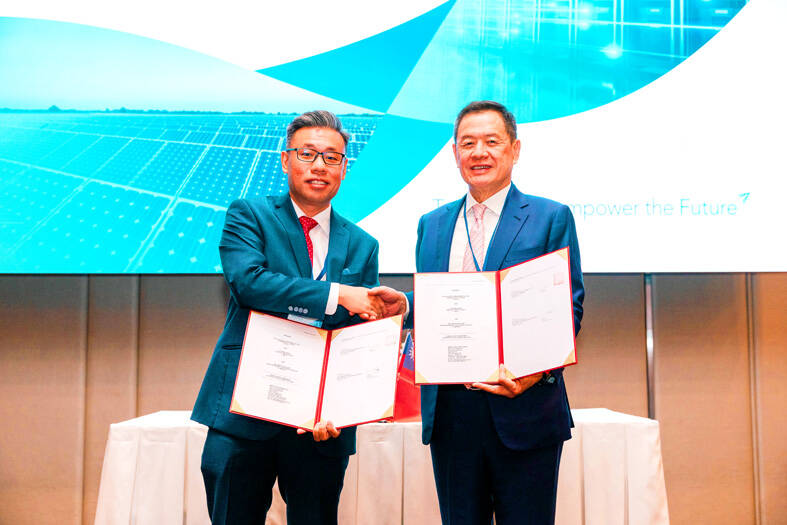Teco Electric and Machinery Co Ltd (東元電機) has signed an agreement to acquire Malaysia’s mechanical, electrical and plumbing (MEP) engineering company NCL Energy Sdn Bhd, as the Taiwanese industrial motor manufacturer pursues booming opportunities in the Southeast Asian country’s data center and renewable energy markets.
Teco plans to acquire an 80 percent stake in NCL, becoming its largest shareholder, the company said in a statement yesterday.
Together with a proposed investment in NCL’s renewable energy subsidiary, NCL Green Energy Sdn Bhd, the deal would total up to 70 million ringgit (US$15.8 million), Teco said.

Photo courtesy of Teco Electric & Machinery Co
The transaction is expected to be completed in the second quarter of this year, the company said.
Teco’s board of directors approved the acquisition and investment plans on Friday last week, and the company held a signing ceremony in Kuala Lumpur yesterday.
“With its low electricity costs, vast land availability and strategic location near Singapore, Malaysia has attracted significant investment in data center construction, making it the country with the highest number of new data centers in Southeast Asia,” Teco chairman Morris Li (利明献) said in the statement.
Entering Malaysia’s data center MEP engineering market is just the first step, as Teco plans to expand into solar power plant, battery energy storage system, electric vehicle charging and MEP equipment sales to seize growing market opportunities there, he said.
NCL has been engaged in MEP and solar engineering in Malaysia for nearly 20 years, Teco said.
Teco has also established a strong working relationship with NCL on two hyperscale data center projects recently, the company added.
Malaysia is gearing up to become a major player in the global semiconductor industry after signing a major deal with UK chip giant Arm Holdings PLC on March 5, aiming to move into more value-added production, such as chip fabrication and integrated circuit (IC) design, from back-end IC packaging in the next five to seven years.
In addition, Malaysia has attracted sizeable investments from global tech giants such as Google, Microsoft Corp, Amazon.com Inc’s Amazon Web Services Inc and Oracle Corp in the data center area, as the country looks to position itself as Southeast Asia’s data center hub in the next few years.
Against this backdrop, the NCL deal aligns with Teco’s strategy of increasing overseas revenue to more than 50 percent within the next two to three years by targeting Southeast Asia’s high-growth potential markets, the company said.

GROWING OWINGS: While Luxembourg and China swapped the top three spots, the US continued to be the largest exposure for Taiwan for the 41st consecutive quarter The US remained the largest debtor nation to Taiwan’s banking sector for the 41st consecutive quarter at the end of September, after local banks’ exposure to the US market rose more than 2 percent from three months earlier, the central bank said. Exposure to the US increased to US$198.896 billion, up US$4.026 billion, or 2.07 percent, from US$194.87 billion in the previous quarter, data released by the central bank showed on Friday. Of the increase, about US$1.4 billion came from banks’ investments in securitized products and interbank loans in the US, while another US$2.6 billion stemmed from trust assets, including mutual funds,

Micron Memory Taiwan Co (台灣美光), a subsidiary of US memorychip maker Micron Technology Inc, has been granted a NT$4.7 billion (US$149.5 million) subsidy under the Ministry of Economic Affairs A+ Corporate Innovation and R&D Enhancement program, the ministry said yesterday. The US memorychip maker’s program aims to back the development of high-performance and high-bandwidth memory chips with a total budget of NT$11.75 billion, the ministry said. Aside from the government funding, Micron is to inject the remaining investment of NT$7.06 billion as the company applied to participate the government’s Global Innovation Partnership Program to deepen technology cooperation, a ministry official told the

Taiwan Semiconductor Manufacturing Co (TSMC, 台積電), the world’s leading advanced chipmaker, officially began volume production of its 2-nanometer chips in the fourth quarter of this year, according to a recent update on the company’s Web site. The low-key announcement confirms that TSMC, the go-to chipmaker for artificial intelligence (AI) hardware providers Nvidia Corp and iPhone maker Apple Inc, met its original roadmap for the next-generation technology. Production is currently centered at Fab 22 in Kaohsiung, utilizing the company’s first-generation nanosheet transistor technology. The new architecture achieves “full-node strides in performance and power consumption,” TSMC said. The company described the 2nm process as

Even as the US is embarked on a bitter rivalry with China over the deployment of artificial intelligence (AI), Chinese technology is quietly making inroads into the US market. Despite considerable geopolitical tensions, Chinese open-source AI models are winning over a growing number of programmers and companies in the US. These are different from the closed generative AI models that have become household names — ChatGPT-maker OpenAI or Google’s Gemini — whose inner workings are fiercely protected. In contrast, “open” models offered by many Chinese rivals, from Alibaba (阿里巴巴) to DeepSeek (深度求索), allow programmers to customize parts of the software to suit their